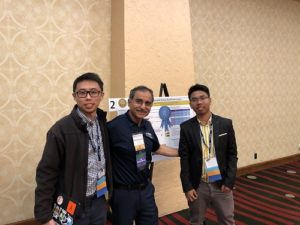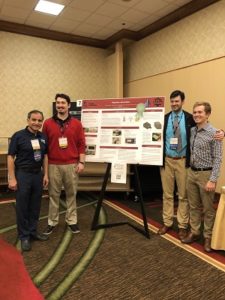Engineering Students Unveil Projects to Help Solve World’s Humanitarian Problems at the IEEE Global Humanitarian Technology Conference Student Poster Competition, Seattle, WA
by Mostafa Mortezaie, GHTC 2019 Student Poster Competition Chair
Seattle, Wash. – Engineering students from around the world convened in Seattle on October 17, 2019 to present their innovative projects to solve world’s humanitarian problems by using advanced technologies to address critical issues for the benefit of the resource-constrained and vulnerable populations in the world at the IEEE Global Humanitarian Technology Conference (GHTC) Student Poster Competition: https://ieeeghtc.org/program/student-poster-compeition/
Students’ projects supported key focused areas of GHTC which is in harmony with the United Nation Sustainable Development Goals and include:
- Affordable & Clean Energy
- Agriculture & Food Security
- Clean Water & Sanitation
- Good Health and Well Being
- Disaster Mitigation, Preparedness, Response & Recovery
- Quality Education
- Other Related United Nations Sustainable Development Goals
Competition Winners:
Judges Award ($750)
Automated Malaria Classification System
An Internet of Things (IoT) system that provides early stage diagnosis of Malaria by utilizing smartphone with attachable inexpensive microscope using an edge computing mobile application system, with image recognition algorithm and deep learning that gives accurate counts of infected blood cells with 96% accuracy.
Authors: Wanzin Yazar (UC Berkeley), Austin Tsang (San Francisco State University)
Technical Award: $500
Hydration Automation
A low, cost, solar powered, small factor, smart, and sustainable system that monitor and manage water level and distribution in water tanks. The system is comprised of Sensing Units, Relay Units, and an Actuating Unit with a wireless communication subsystem between the units to transport data. A micro controller is used to gather and send the water tank level data over the wireless subsystem to the Actuating Unit which collects and analyze the data from all the tank sensors and controls valves or pumps to distribute the correct amount of water to different locations in the system when needed. The wireless communications subsystem uses a custom routing protocol atop a transport layer such as LoRa and a wireless physical layer utilizing RFM95 Radio Modules in the 915/916 MHz frequency band.
Authors: Peter Ferguson, Zach Cameron, Nicholas Kniveton, Will Tuttle (Santa Clara University).
People’s Choice Award: $250
Solar Energy Tracking System
A system that collect and store solar energy in an efficient way for “off-grid” application. The system uses two solar panels, six light dependent resisters (LDRs), two unipolar stepper motors, two L298 driver boards, and an ATmega328P microprocessor. The system uses the light dependent resistors to interpret the amount of light in a specific area on the system’s platform. This analog signal is then converted to a digital signal, represented by a value, ranging from 0 to 100, and is used to direct the driver boards, moving the panel to the optimum orientation. The energy collected is stored in a lithium ion battery pack for immediate or later use.
Authors: David Palmer and Janio Moreno, DeVry University
Some of the students’ projects in the competition were funded by the IEEE EPICS (Engineering Projects in Community Services) and students in these projects are networking with corporate and non-profit representatives to continue to design and improve projects that have immediate application in their communities.






